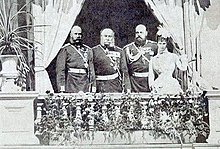Three Emperor's Alliance
The Dreikaiserbund was a secret neutrality agreement concluded on June 18, 1881 between the German Empire , Austria-Hungary and Russia .
The failure of the three emperor agreement at the Berlin Congress
The Dreikikerbund continued the three-emperor agreement of 1873, which had since broken up , and was part of Bismarck's rebuilding of his alliance system after the Berlin Congress of 1878. This rebuilding became necessary when the Russian Chancellor Gorchakov terminated the three- emperor agreement . He was disappointed that the German Reich had not sided with the Russian demands at the Berlin Congress and that the peace of San Stefano (in terms of power politics, especially in favor of Austria-Hungary) had been largely revised.
In fact, the Russian relationship with Great Britain and France was considerably strained because of the forced revision of San Stefano and the only alternative seemed to be a renewed merger with the German Empire and Austria-Hungary. Gorchakov had made a mistake at the Berlin Congress when he continued his collaboration with British Prime Minister Benjamin Disraeli . Great Britain gave no consideration for the termination of the three emperor agreement.
In order to fully enforce the revision of San Stefano, British troops attacked the emirate of Afghanistan on Disraeli's orders in November 1878 . In return for this, Great Britain received the island of Cyprus from the Ottoman Empire at the Berlin Congress . From Afghanistan, the British troops should "threaten" the emirate Bukhara, which is under Russian protectorate , if Russia attacks the Ottoman Empire again or tries to enforce the Treaty of San Stefano. However, during the 2nd Anglo-Afghan War it took British troops two years to bring Afghanistan under control.
Completion of the three emperor's union
On June 18, 1881, Russia, the German Empire and Austria-Hungary formed the Three Emperor League. The contracting parties committed themselves to benevolent neutrality in a potential war with a fourth party for a period of three years and agreed upon an obligation to consult for their activities in the Balkans . The German Empire could thus be sure of Russian neutrality in a possible Franco-German war, while Russia was secured with the Imperial German and Austro-Hungarian neutrality in the event of a war against Great Britain because of the Straits issue or against the Ottoman Empire in the Balkans ( Oriental Question ).
Consequences of the three emperors

The three emperor's union gave Russia a free hand in Central Asia. In response to the occupation of Afghanistan by British troops, the Russian army began occupying the southern Trans-Caspian region in 1881, which is on what is now Turkmenistan . This process lasted until 1885, which culminated in a military incident between Russian and Anglo-Afghan troops near the city of Kushka . The goal of Russian diplomacy after the occupation of southern Transcaspia was to establish Afghanistan as a buffer zone between the Russian Empire and British India .
Between April 1884 and January 1885, the German Empire acquired colonies in Africa. In the event of a military conflict with Great Britain there, the three emperors' union guaranteed the neutrality of Russia and Austria-Hungary.
Extension and break of the three emperor's alliance
The stressful Balkan conflict between Russia and Austria-Hungary could not, however, be bridged by the three emperors. In spite of tensions between Vienna and Saint Petersburg , it was extended again on March 27, 1884. But when the rivalry between the two states broke out again in the Balkans in the Bulgarian crisis of 1885/86, the three emperors broke up and Bismarck had to save his alliance policy with the so-called system of temporary workers.
"Bismarck himself felt" - according to Rudolf Augstein - in the Dreikaiserbund "like a man who kept two chain dogs on a leash that he had to keep from driving each other to the throats."
The end of the three emperors and its consequences
Bismarck's primary goal after the end of the three emperor's union was to counter the threat to the security of the German Reich that was emerging with the alienation of Russia by means of a renewed contractual relationship. As a result, Bismarck exerted enormous political and economic pressure on Russia to restore it to a contractual relationship and to show it threatened isolation in the European system of power. The direct consequence of the failure of the three emperors was the conclusion of the reinsurance treaty and the Mediterranean Entente .
literature
- Andreas Rose: German Foreign Policy in the Bismarck Era (1862-1890). (= History compact. ) Wissenschaftliche Buchgesellschaft, Darmstadt 2013, ISBN 978-3-534-15188-2 .
Individual evidence
- ↑ Rudolf Augstein: On the inclined plane to the republic. In: Der Spiegel 2/1985, January 7, 1985. See also Robert Lucius von Ballhausen's “Bismarck Memories”, in which he reproduces a conversation with Bismarck on December 13, 1886 about the Bulgarian crisis as follows: “The Austrians made foolish politics and he [di Bismarck] stands between them and the Russians, [sic] as between two vicious dogs who would collapse if he let go of the collar. "Bismarck-Memories of Baron Lucius von Ballhausen, Berlin, Stuttgart 1920, p 359.